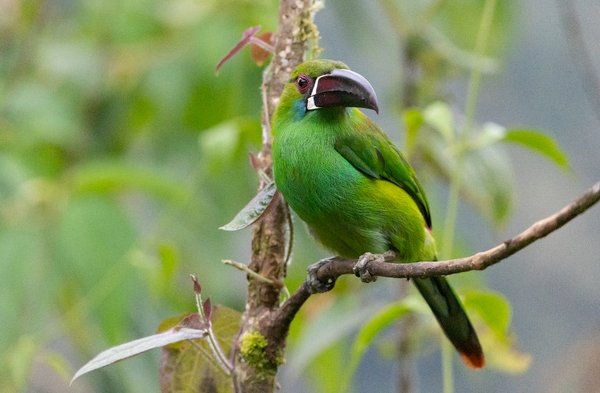- Share this article
- Subscribe to our newsletter
Impact of large-animal extinction on rainforests greater than thought
A new study by researchers of the Senckenberg Biodversity and Climate Research Centre, in Frankfurt/Main, Germany, finds that ecosystem services provided by animals in Neotropical rainforests can be notably compromised even if only a small fraction of large-bodied animal species are lost.
The authors of the study, recently published in ‘Nature Communications’, warn against underestimating the effects of downsizing in animal communities.
Tropical rainforests are emptying out because of the ongoing extinction of animal species caused by overhunting and habitat fragmentation. However, it is not only species as such but also the number of individuals of species living in rainforests which continue to decline. Large-bodied species, which are particularly sensitive to changes, decline at a comparably faster rate than other species.
The study by the Senckenberg researchers shows that the resulting animal downsizing in rainforests might have severe consequences for ecosystem services.
“The effect of downsizing of animal communities is three times larger for services that are provided by ecological networks than for their structural stability. This is because the species that die out first are those who contribute unique services and keep the rainforest functioning,” says researcher Dr Isabel Donoso, an Alexander-von-Humboldt fellow who led the study at Senckenberg.
Seed dispersal by animals a pivotal service in rainforests
Donoso and her team simulated the effects of the loss of large-bodied fruit-eating birds for eight locations in the Andes. The simulation was based on data about interactions between bird and plant species recorded over many years in the study region.
To measure the ecosystem services provided by birds, the researchers simulated the distance of avian seed dispersal. Seed dispersal by animals is a pivotal service which most tropical trees require in rainforests. The study is one of first attempts to quantify the consequences of animal downsizing for the functioning of rainforest ecosystems.
“If the largest ten per cent of the fruit-eating birds were to die out, the distance over which seeds would be dispersed would shrink by almost 40 per cent. In contrast to this, the structural stability of an ecological network would be changed to a much lesser degree,” says Dr Matthias Schleuning of the Senckenberg Biodiversity and Climate Research Centre, explaining the results of the simulation. “A ten per cent loss of the largest fruit-eating birds would reduce the number of interactions between frugivorous birds and plants by only ten per cent.”
So why should one care if in the future seeds of rainforest trees are dispersed short-distance rather than long-distance? First of all, long-distance seed dispersal helps the genetic exchange between forest patches and makes them more resilient to change. What’s more important is that the nearer a seed remains to the parent tree, the less likely it will germinate and grow. Since large-bodied fruit-eating birds predominately disperse large seeds, trees with large seeds are the ones supposedly losing out.
“In terms of tree composition, future rainforests will probably look very different than the current ones,” explains Donoso. “Other studies have already shown that such future rainforests will likely be able to store much less carbon.” In light of this it would be short-sighted to underestimate the looming consequences of animal downsizing, warns Schleuning. “We need to ramp up our efforts to protect large-bodied species in rainforest habitats,” he cautions. “Only then will global climate and all of us continue to benefit from the services which tropical rainforests provide to us.”
(Senckenberg/wi)
Publication
Donoso, I., Sorensen, M., Blendinger, P.G., Kisslinkg, D., Neuschulz, E.-L., Mueller, Th. And Schleuning, M. (2020): Downsizing of animal communities triggers stronger functional than structural decay in seed-dispersal networks. Nature Communications, doi: 10.1038/s41467-020-15438-y





Add a comment
Be the First to Comment